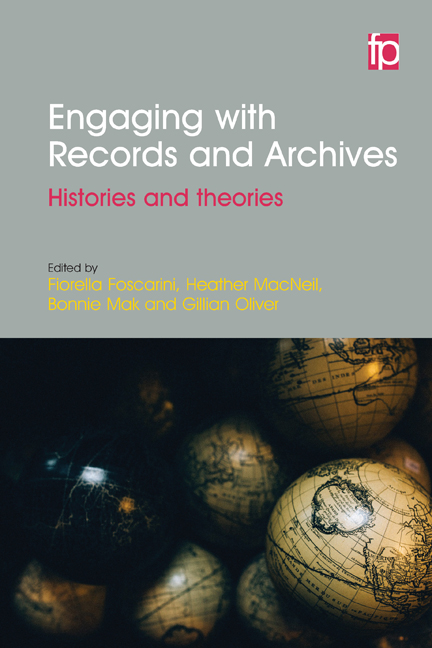Book contents
- Frontmatter
- Frontmatter
- Editors and contributors
- Editors’ introduction
- PART 1 RETHINKING HISTORIES AND THEORIES
- PART 2 ENGAGING RECORDS AND ARCHIVES
- 6 The use and reuse of documents by chancellors, archivists and government members in an early modern republican state: Genoa's Giunta dei confini and its archives
- 7 The bumpy road to transparency: access and secrecy in 19th-century records in the Dutch East Indies
- 8 Archival ethics and indigenous justice: conflict or coexistence?
- 9 History and development of information and recordkeeping in Malawi
- 10 History of community archiving in Poland
- 11 Reflecting on practice: artists’ experiences in the archives
- Index
6 - The use and reuse of documents by chancellors, archivists and government members in an early modern republican state: Genoa's Giunta dei confini and its archives
from PART 2 - ENGAGING RECORDS AND ARCHIVES
Published online by Cambridge University Press: 08 June 2018
- Frontmatter
- Frontmatter
- Editors and contributors
- Editors’ introduction
- PART 1 RETHINKING HISTORIES AND THEORIES
- PART 2 ENGAGING RECORDS AND ARCHIVES
- 6 The use and reuse of documents by chancellors, archivists and government members in an early modern republican state: Genoa's Giunta dei confini and its archives
- 7 The bumpy road to transparency: access and secrecy in 19th-century records in the Dutch East Indies
- 8 Archival ethics and indigenous justice: conflict or coexistence?
- 9 History and development of information and recordkeeping in Malawi
- 10 History of community archiving in Poland
- 11 Reflecting on practice: artists’ experiences in the archives
- Index
Summary
IT IS GENERALLY accepted that the transformation of the archives’ function from self-documentation memory to source memory occurred following a long process which started during the French Revolution and matured when archives started to be mainly perceived as cultural institutions (Bautier, 1968; Zanni Rosiello, 1987). Nonetheless, it is equally true that even before the French Revolution, the function of self-documentation memory had an impact on the physical shape of the archives, changing it over the time.
In this perspective, the Genoese Giunta dei confini is a particularly relevant case which illustrates the relationship between the idea of the history of a specific archive (Zanni Rosiello, 1987, 44) and the concept of historical sedimentation of archives that has been suggested (Bologna 2014) by recent scholarship. The case provides important insights into the relationship between the slow progression towards the scientific and cultural use of an archive and its previous administrative and political uses: so much so that the papers of the Giunta's archive eventually became one of the most important sources for the history of many Ligurian communities.
The following pages discuss a single case study against the backdrop of an archive characterized by an extremely complex process of sedimentation, which, through further study of other aspects and fonds, could add important elements to the debate.
Territorial control in early modern Italy: producers, functions and archives
During the early modern age the state progressively increased and improved its instruments of territorial control and the exercise of sovereignty. Among them, those institutions that were charged with the settlement of territorial disputes were of great significance. So much so that the archives produced by these institutions should be considered as fully fledged state instruments in themselves. Between 1560 and 1742 the Duchy of Florence, the Republic of Venice, the Republic of Genoa, the Duchy of Milan and the Kingdom of Sardinia all established magistracies charged with overseeing borders, all of which exercised similar functions.
- Type
- Chapter
- Information
- Engaging with Records and ArchivesHistories and Theories, pp. 107 - 126Publisher: FacetPrint publication year: 2016



